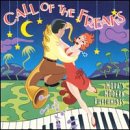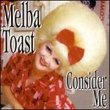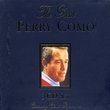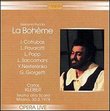| All Artists: Mora's Modern Rhythmists Title: Call of the Freak Members Wishing: 0 Total Copies: 0 Label: Mr. Ace Records Original Release Date: 9/12/2000 Re-Release Date: 8/22/2000 Genres: Alternative Rock, Jazz, Pop Styles: Swing Jazz, Vocal Jazz Number of Discs: 1 SwapaCD Credits: 1 UPCs: 670917023326, 670917026129 |
Search - Mora's Modern Rhythmists :: Call of the Freak
 | Mora's Modern Rhythmists Call of the Freak Genres: Alternative Rock, Jazz, Pop
|
Larger Image |
CD DetailsSimilar CDs
|
CD ReviewsCalling All Freaks! Joseph | Philadelphia, PA USA | 11/17/2000 (5 out of 5 stars) "According to Dean Mora's liner notes in this third CD by Mora's Modern Rhythmists, the title, "Call of the Freaks" is something of a mission statement for the band. Whether known to the witty and literate Mr. Mora or not, he could not have chosen a better word. Without question, "freak" has some pretty unpleasant connotations in colloquial English, but for those of us who actually read the prefatory etymological information in dictionaries (oh, come on, I'm not the only one) the choice could not have been more apropos. According to the 1936 edition of Webster's Universal, "freak" is derived from the Anglo Saxon "freca" which meant "a bold man, a warrior." And on the musical scene today, there is no warrior more fervent, and no man more bold in keeping the torch of vintage swing alive than Dean Mora.True, he has the able assistance of some first-rate people. His band is stocked with exceptionally fine instrumentalists. His vocalist, Kayre Morrison, is as talented as she is lovely (and that's saying a hell of a lot if you've ever seen the band perform live). Kayre's husband Bill is the best cover art illustrator this band could possibly have. And Dean's wife Rende is an indefatigable booster for the band and a delightful emissary of its enormous goodwill. This latest CD is the distillation of the various forms of genius that all of the above bring to bear on the task of creating some really delectable swing.As with "Mr. Ghost Goes to Town," the cover art is worth a moment of study. The muse of music breathing life into her saxophonic suitor is dancing against a backdrop that could have come from the imagination of a George Herriman. The defiantly unnatural nature depicted in the lightning-bolt trees, the bathing-suit print hills, and empurpled clouds (one of which is suggestively anthropomorphic) all foretell of what is inside the package. This is no ordinary band, and even by its own standards this is both an unusual and rather daring CD.What, you might be tempted to ask, could possibly be so daring about a CD of vintage swing? Well, there are very few practitioners of this particular art today. Throwing your heart and soul into something appreciated by a relatively small-but growing-audience is about as risky as it gets in the music business. And the Rhythmists have dared to tread on some hallowed ground with this CD. There is no danger that they shall be smitten or cast from the temple, however; to the contrary the ghosts and the gods must be delighted. Take, for example, "Get Rhythm in Your Feet," "Hunkadola," and "Serenade to a Wealthy Widow." In the period before Harry James joined, Goodman's band was more rollicking and bouncy than sharp and streamlined. The precision and power were there, but with a certain relaxed looseness that was less in evidence after the end of 1936. These three tunes by the Rhythmists not only capture the unique sound and virtuosity of Goodman's early orchestra; they also capture that same precision, power, and relaxed looseness. This is especially apparent with the complicated dynamics of "Serenade to a Wealthy Widow." The tune is complicated enough that it would be easy even for an accomplished orchestra to falter, stiffen up, and stop swinging. No such problem here. The band keeps the take jumping, and the spark behind the performance is clearly Mora's powerfully rhythmic piano playing. This is a band that would be good enough without him, but is nothing short of superb under Dean's intelligent and thoughtful direction. Goodman would be pleased.So too would be Helen Ward. Kayre's vocal on "Get Rhythm in Your Feet" is gutsier than Ward's version, but has the same bright, cheery sparkle that was so much a signature of Ward's singing. The sax section really outdoes itself in capturing the lilt of Goodman's early band. (It's almost scary-freaky?-it's done so well!) Kayre belts out the lyric with her usual strong sassiness. Excellent range, control, elocution and phrasing really get the best out of this lyric, making the performance one of the high points of a truly great CD. Even thinking about recreating one of Duke Ellington's `30s performances would be considered blasphemy among some purists, but the band's take on "Daybreak Express" is a stunner. The deliberate discordance and blue-note swinging that Ellington became famous for in the early `30s is a very tough thing to re-create. This performance is a reminder that Ellington, while a genius, had a strong background as the leader of a show band. It's an aspect of Ellington's musical career that gets a surprisingly small amount of attention today, but leave it to Dean Mora to dare to go where others don't.Additionally daring is the decision to reprise a couple of tunes from the band's first CD, "My Favorite Band." "I'm Good for Nothing but Love" and "Night Wind" get another airing, this time with reworked arrangements and spectacular vocals by Kayre Morrison. The first is the perfect sort of Ruth Etting torch song for Kayre. It is a challenging lyric in a complex setting, and she handles with confidence, deftness, and great feeling. Her interpretation of "Night Wind" is strong and sultry, a reflection of the new arrangement. Very much in evidence on the new rendition is Kayre's taut, controlled vibrato, which is both exciting and enticing. To call this lady talented is severely understating the matter. She's phenomenal.Last but by no means least is "It's Over Before We're Through" sung by the legendary Leonard Reed. Leonard Reed had a hit with this in 1932, and was Willie Bryant's partner for several years. More recently, he led the assembled throng at the Palladium through the Shim Sham Shimmy during Camp Hollywood 2000, with Mora's Modern Rhythmists on the stand. Over in the seats, the great Spud Murphy nodded appreciatively and said, "That's one hell of a band." And that says it all."
|

 Track Listings (20) - Disc #1
Track Listings (20) - Disc #1


